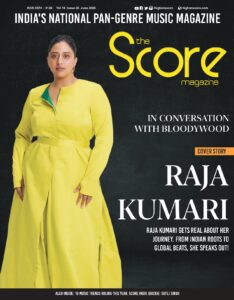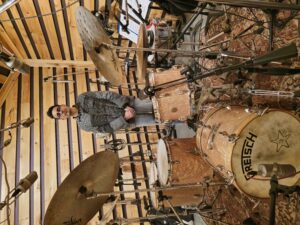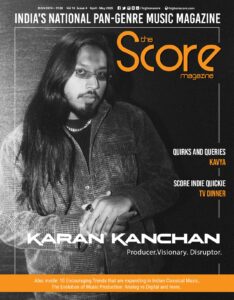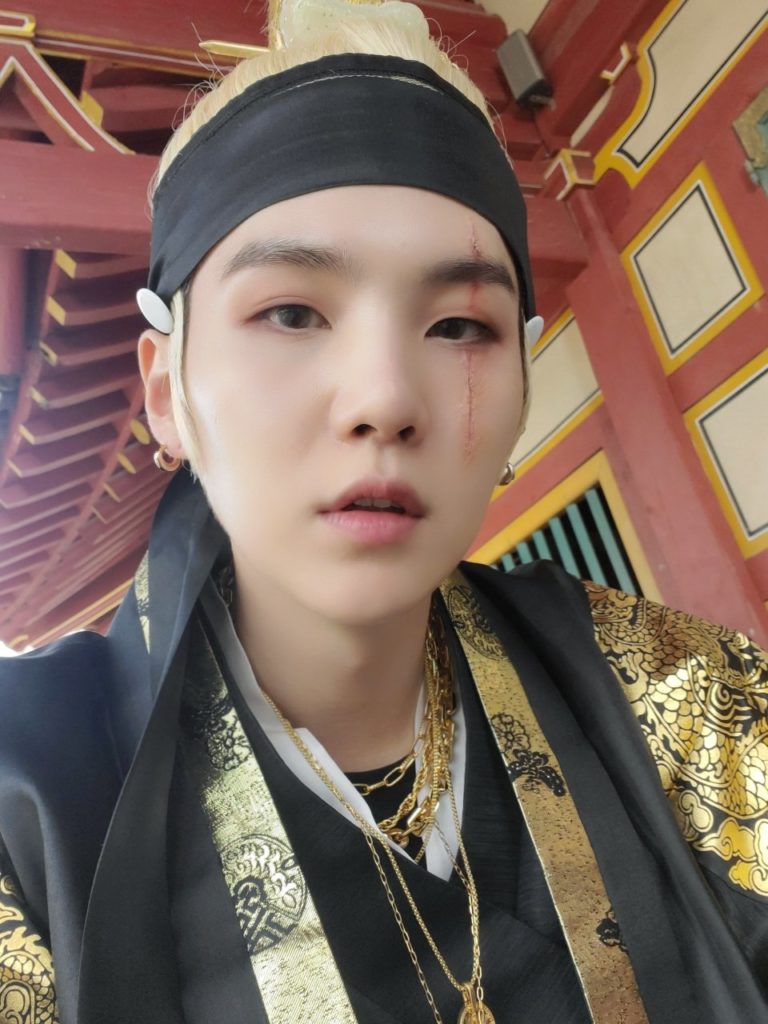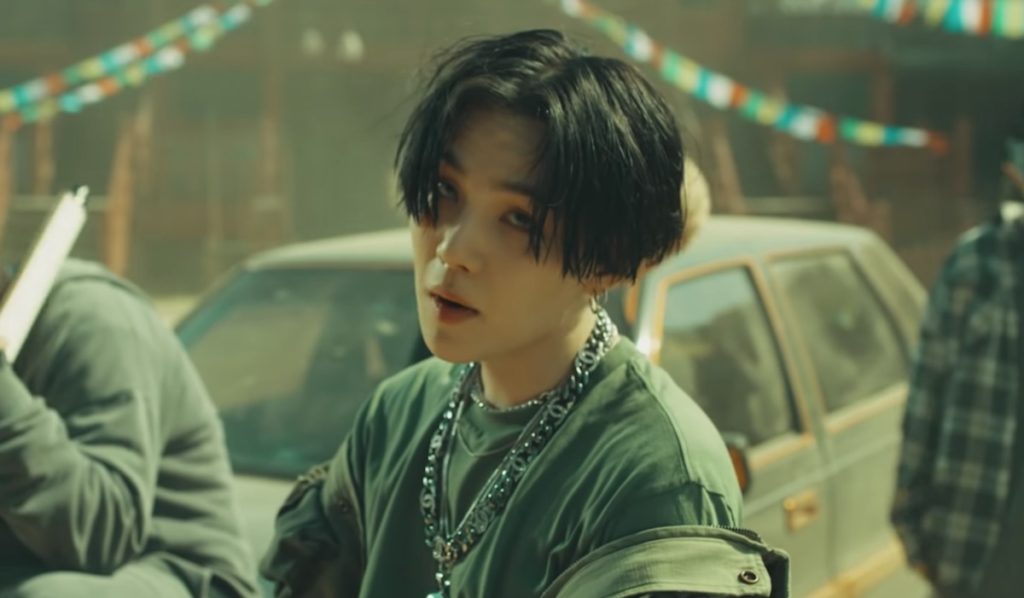
“ Behind every idol rapper/ There’s a weak self standing/It’s a little dangerous.”
– “ Agust D, The Last”
SUGA AKA Min Yoongi, is BTS’s lead rapper. A composer for the group and the first member of BTS to be promoted to full member of the Korea Music Copyright Association (KOMCA) in 2018, SUGA started as an underground rapper under the name “Gloss”, a play on his given Korean name, Yoongi, which means “to shine”.
As a teenager, SUGA listened to groups such as Epik High, and went on to collaborate with his artistic role models Tablo, Tukutz and Mithra Jin on their song Eternal Sunshine in 2019. In the song, Tablo explores the inevitable emptiness that comes with chasing material goals, rapping: “Do you get lonely/Sick with anxiety/ can’t trust nobody/ well same here” ; the song also has the searingly honest lyrics “From the moment we are born/ We walk towards death/Life is accelerating solely for the success of fortune”, going on to declare that what is left in the end is a distinct, inescapable sense of ennui.
His music under his solo moniker Agust D carries forth this sense of existential struggle and quiet despair, a melange of emotions universal to the human experience.
Agust D is SUGA spelt backwards, while the D and T stand for Daegu Town, which is where he grew up. SUGA has released two mixtapes as this persona: Agust D and D-2. In the title track for Agust D, he says with discernible anger,“ some think it was easy for me to reach my position/fuck you, I am a thorn in the eyes of those who cannot become successful.” Agust D is characteristically defiant: “this k-pop category isn’t big enough for me” and flexes hard: “my seat is business you economy, always behind me and kissing my ass”.
In Give it to me, he flawlessly stutter raps, “Fame. Flashlight/ give- give it to-me.” Agust D sees SUGA break norms, bait criticism and provoke outrage with the practiced ease of a seasoned provocateur. When he claims to send his listeners to Hong Kong with his tongue technology, he is really pushing the boundaries of his idol rapper image with palpable relish.
SUGA has been an outspoken advocate for mental health and one of the rare K-pop stars to be candid about psycho-social disabilities, reaching out to an audience that is often overlooked amidst conversations about chart positions and sales figures. In an interview with Esquire Magazine, he said :
“People’s conditions vary day by day. Sometimes you’re in a good condition; sometimes you aren’t. Based on that, you get an idea of your physical health. And that same thing applies mentally. Some days you’re in a good state; sometimes you’re not. Many pretend to be okay, saying that they’re not ‘weak,’ as if that would make you a weak person. I don’t think that’s right. People won’t say you’re a weak person if your physical condition is not that good. It should be the same for the mental condition as well. Society should be more understanding.”
Agust D’s art reflects this mindset. In 140503 at Dawn, he sheds light on his phobia of people and how he is always prepared with two masks, hiding himself as if he is a “criminal”. His lyrics often echo the discomfiture of T.S. Eliot’s early poems, particularly the Love Song of J. Alfred Prufrock, where Eliot explores ideas of the social self and the individual self, examines the tortured psyche and comments on social and psychological anxieties.
In The Last, Agust D breathily recounts his experience at a psychiatrist’s office with his parents and states that he falls “sometimes into depression and compulsive behaviours”. The doctor’s question in the song has been censored to which Agust D replies, “I have been like that before”, highlighting self-doubt and deep-seated anguish in his lyricism.
Big Houses, emblematic of material success, are a recurrent theme in Yoongi’s music. In BTS’s No more Dream, SUGA raps about wanting “a big house, big cars and big rings,” and in Moonlight, Agust D 2 (his second mixtape), he recounts his journey by rapping: “The beginning was small, Daegu, yeah, from a basement in Namsandong to a penthouse in Hannam the Hill now, ha.” His financial struggles and later fame is also explored in his mixtapes, as is the acceptability of underground rapcore elements in what is perceived as sanitized pop music.
As Agust D, Yoongi explores themes such as low self-worth, depression, loneliness, anxiety and the price public personas pay for fame. D-2 comes alive when he asserts how successful he and BTS have become – rightfully so. BTS were not always the superstars that they are today. Coming from a smaller label at the time and competing with more commercially viable and established acts was no mean feat for seven young boys. RM and SUGA were slammed by rapper B-FREE back in 2013, accusing them of “selling out”, harshly criticizing them for choosing the path of becoming idol rappers. It isn’t surprising then, that BTS have diss tracks like Mic Drop and UGH.
Daechwita is the diss track that overpowers all other diss tracks in D-2. Set to the marching beats of traditional Korean music, it has been hailed as alyrical masterpiece, becoming the first ever number one hit on the Billboard Rap digital songs chart by a South Korean musician. The music video sees Agust D go back in time and become a king. The lyrics “Born a slave but now a king/ Berserk tiger Gwanghae Flow” tells the story of a powerful and eccentric monarch, possibly modelled on Gwanghae-Gun, a Joseon era king. He raps about “trapping the past in a rice chest”, a reference to crown prince Sado, who died of starvation trapped in a rice chest,a punishment that was meted out by his father. The historical references, the cinematic allusions to Korean history and the homage to traditional music sets this song apart from all his other hip-hop compositions.
Daechwita is a perfect representation of Agust D’s identity as a world famous rapper who remains attached to his musical and cultural roots. The impact of Daechwita was so great that it prompted the Korean minister for culture, sport and tourism, Park Yang Woo to applaud SUGA for celebrating traditional Korean music. In the music video, Agust D makes an effortless switch from being a King to a commoner, with modern Agust D mincing no words about where SUGA is in his career “I’m a king/ I’m a boss/ Remember my name.”
D- 2 also features BTS bandmate and group leader, RM, in the track Strange, where they rap about wealth, greed, war, poverty and capitalism. Additionally, the mixtape features NiiHWA( 28), Max (Burn It) and Kim Jong-wan from the rock band NELL (Dear My Friend).
28 on D-2 describes a vulnerable moment in SUGA’s life, where SUGA wonders, “Where did the fragments of my dream go/though I’m breathing/ it feels like my world has broken down”, while Dear My friend is a nostalgia induced story about a friend who chose a different path in his life. Burn It is a battle between one’s past and present selves. People has Agust D wondering if he is “a good person/ or a bad one” and indulging in intricate wordplay using the Korean words for “love” and “person”, just like RM did on Trivia : Love.
What do you think looks back on some of the themes explored in the first mixtape where Agust D succeeds despite detractors and obstacles. Honsool and Interlude : Set me free highlights the loneliness and anxiety that comes with scaling the heights of success. Honsool is Agust D’s unadulterated confession of very real human fears: “Since it’s (alcohol) is getting to my head, let’s be honest about my life/ Oh yea, money, fame, wealth/trophies and stadiums/sometimes I’d get scared of them/And want to run away/I thought I’d party everyday when I became a superstar/But the ideal is slapping the reality on the back of its head.”
The interlude : Set Me Free evokes painful emotions that are difficult to grapple with, when he sings, “Set me free, I’m floating in the void/ Set me free, these days I feel melancholy for no reason/ One day I crawl on the floor/On another day, I fly high in the sky.” This track, by virtue of SUGA’s gossamer-yet-sonorous vocals, is quite distinct from every other song on the Agust D album.
Agust D deals with depression, anxiety, self-awareness, social perception and incorporates lessons Min Yoongi the person and Agust D the artistic persona, has learnt on the way. The conflict of identity is evident in his musical catalogue – at the helm of pop super stardom as SUGA in the mega-group BTS, and an angry, often irreverent South Korean rapper with underground roots as Agust D.
Agust D does not fully dissociate from BTS’s SUGA. This artistic identity exists while being aware of his other personas. It breaks down the fourth wall to highlight a system that alternately celebrates and demonizes, among other things, the sides of him that the world worships. Most importantly, it is Agust D’s empathy and ability to be vulnerable that draws the listener in, with an artistry that has been carefully cultivated to channel an idealist’s rage against the edifice of a domineering system.

